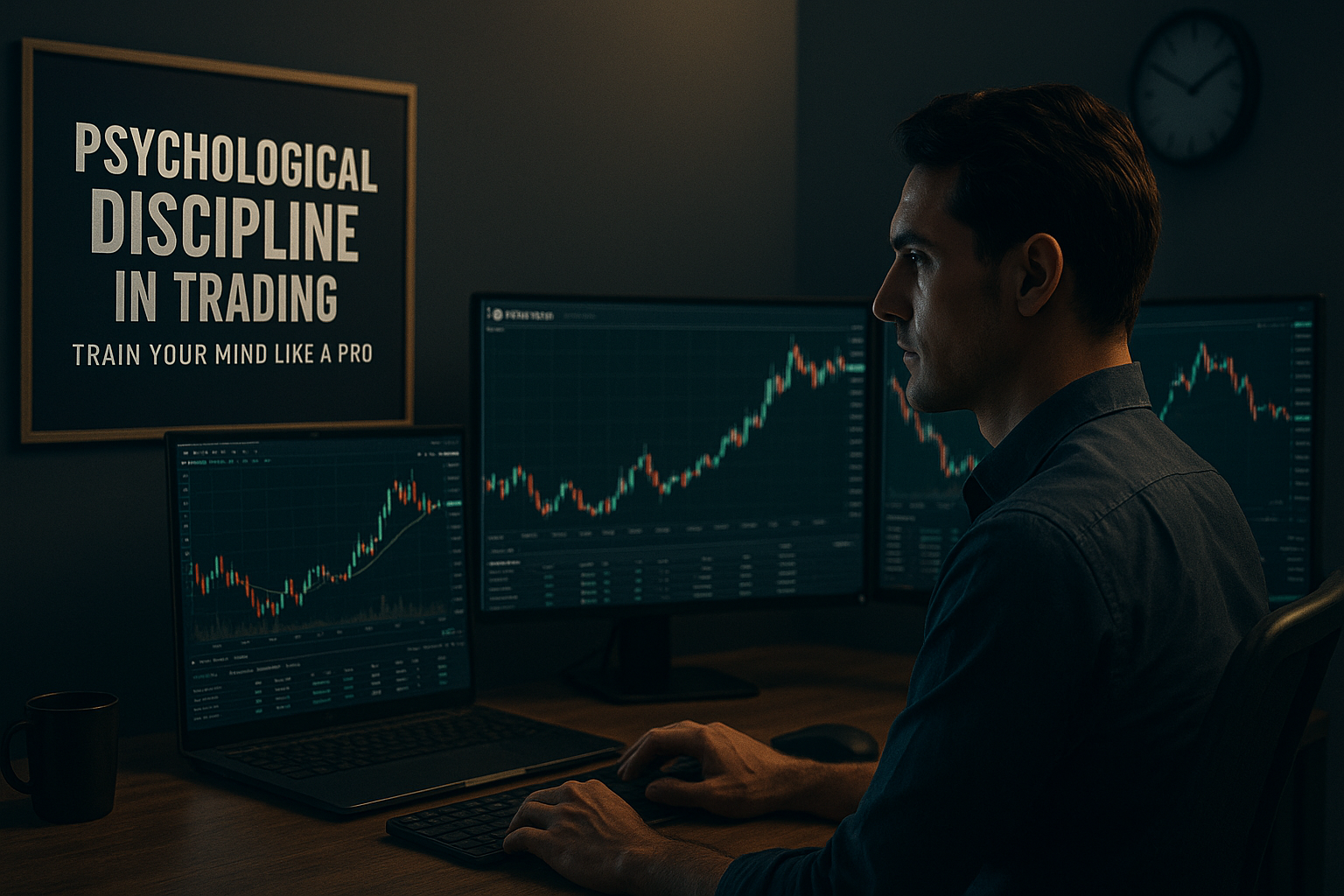Psychological Discipline in Trading: How to Train Your Mind Like a Pro
Introduction: The Untapped Asset of Every Trader
Most traders obsess over technical indicators, candlestick patterns, and new strategies — yet they overlook the single most important asset in their arsenal: their mind for psychological discipline in trading.
At STRATEGIC, we’ve mentored dozens of traders and witnessed firsthand how those who master their emotions outperform even those with the best systems. psychological discipline in tradingisn’t just a buzzword — it’s the backbone of consistency. In this guide, we’ll break down how to train your mind like a professional trader using the exact mindset tools and techniques we use in our firm.
1. Why Psychology Matters More Than Strategy
A good strategy means nothing if your emotions keep overriding it.
-
Fear makes you exit early.
-
Greed makes you overleverage.
-
Revenge pushes you into bad setups.
You may know what to do — but do you actually do it? That gap is where psychology lives.
At STRATEGIC, we define discipline as the ability to follow your trading plan — especially when it’s emotionally uncomfortable.
2. Top Emotional Traps That Destroy Traders
Understanding these mental pitfalls is the first step to avoiding them:
-
Overtrading: Trying to win back losses by taking too many trades.
-
Revenge Trading: Emotional responses that ignore logic or setups.
-
FOMO (Fear of Missing Out): Entering trades late out of panic.
-
Impulse Decisions: Letting news or candles override your plan.
-
Lack of Confidence: Abandoning your edge after a few red trades.
These patterns are dangerous — not because they’re rare, but because they’re human.
3. STRATEGIC’s Proven Formula for Mental Discipline
We teach traders a systemized approach to strengthen mental control. Here’s our formula:
-
Daily Market Journal: Log not just trades, but emotions before and after execution.
-
Fixed Routine: Trade at the same time daily. This reduces variability and stress.
-
Risk Rules: Never risk more than 1–2% of your capital per trade — no exceptions.
-
Weekly Reflection: Neutral review of mistakes helps detach emotion from analysis.
-
Resilience Protocol: A full mental reset after bad sessions — includes prayer, reflection, and feedback.
This structure keeps traders from spiraling after losses or false wins.
4. Case Study: Recovering from a Losing Streak
A STRATEGIC student hit a 5-trade losing streak and became hesitant to re-enter the market. Emotions clouded every setup.
What we did:
-
Implemented deep journaling (thoughts before/after each trade).
-
Conducted 1-on-1 mentor sessions.
-
Ran simulation backtests to rebuild trust in the system.
Result: Confidence restored, and the student closed the month in profit.
Lesson: Discipline isn’t about never losing. It’s about managing yourself when you do.
5. Daily Exercises to Build Trading Discipline
Here are the actionable mental techniques STRATEGIC teaches:
-
✅ Breathing Control (4-7-8): Inhale for 4 seconds, hold for 7, exhale for 8 before trades.
-
✅ Visualization + Morning Focus: Mentally walk through your setups before the market opens.
-
✅ 20-Second Pause Rule: Before every trade or change, pause and ask: “Is this part of my plan?”
-
✅ Daily Affirmations: Remind yourself of your edge, your rules, and your long-term vision.
-
✅ Trade Only With Checklist: Do not enter unless your entire setup criteria are 100% met.
6. How STRATEGIC Mentally Trains Its Traders
Unlike typical trading academies that focus only on charts, STRATEGIC integrates mindset development into every phase:
-
⚡ Bootcamp Simulations: Controlled stress tests to build emotional tolerance.
-
🧠 Weekly Emotional Journaling: Not just trade data — we track how you felt.
-
📊 Mentor Evaluations: Reviews focus equally on your behavior and your trade setups.
-
🏁 Process Over Profit: Students are rewarded for sticking to rules — not just making money.
We develop emotional mastery — because in the market, your brain is your biggest position.
7. Building Long-Term Resilience
Every trader will experience:
-
A losing streak.
-
Emotional breakdowns.
-
Days where they want to quit.
But the difference-maker? Resilience.
The STRATEGIC way teaches:
-
How to reflect without shame.
-
How to reset after pain.
-
How to show up the next day — not emotionally scarred, but wiser.
Consistency isn’t loud. It’s quiet, boring, and disciplined. That’s the STRATEGIC edge.
Final Thoughts: Discipline Wins, Every Time
Trading success is not about finding the perfect indicator — it’s about executing the same plan, in the same way, every single time.
Your strategy matters. But your psychology controls your execution.
At STRATEGIC, we don’t just teach entries — we build the mind behind the trader.
If you’re serious about leveling up, start with your mindset. Because every win begins inside your head.
Frequently Asked Questions for Psychological Discipline in trading
1. What is psychological discipline in trading?
Psychological discipline in trading refers to the mental ability to stick to your trading plan, manage emotions like fear and greed, and make decisions based on strategy rather than impulses. It’s the foundation of long-term success in the market.
2. Why is mindset more important than strategy in trading?
Even with the best strategy, undisciplined traders often fail because emotions override their logic. Without the right mindset, traders tend to overtrade, panic during losses, and deviate from their plans — leading to poor results.
3. How does STRATEGIC help traders build mental discipline?
STRATEGIC provides structured tools like daily market journals, fixed trading routines, resilience protocols, and emotional coaching through mentor sessions. Traders are trained to follow a process, not just chase profits.
4. What are the most common emotional traps traders fall into?
Some of the most dangerous emotional traps include:
-
Overtrading after a loss
-
Revenge trading to recover money
-
FOMO (Fear of Missing Out)
-
Impulse trading based on sudden market moves
-
Losing confidence after a small drawdown
5. Can emotional control really improve trading performance?
Yes. Traders who learn to control emotions tend to make more consistent decisions, avoid large losses, and recover faster from setbacks. Emotional control leads to better risk management and longevity in trading.
6. What is the 4-7-8 breathing method and how does it help in trading?
The 4-7-8 method involves inhaling for 4 seconds, holding for 7 seconds, and exhaling for 8 seconds. It helps calm the nervous system before a trade, reducing impulsive actions and improving focus.
7. What’s included in STRATEGIC’s Resilience Protocol?
The Resilience Protocol includes mental reset strategies like:
-
Emotional journaling
-
Prayer and mindfulness
-
Mentor feedback sessions
-
Detachment from losses and constructive review
It’s designed to help traders bounce back stronger after emotional sessions.
8. How do STRATEGIC mentors evaluate traders?
Mentors at STRATEGIC assess both trade results and the trader’s behavior. Performance is measured not just by profit/loss, but by how well the trader followed their system, managed emotions, and handled pressure.
9. What should I do after a losing streak?
You should avoid emotional trading, take a step back, review your trading journal, and consult a mentor or coach. Backtesting and simulation exercises can also help rebuild confidence before going live again.
10. How can I start developing trading discipline on my own?
Start by:
-
Creating a fixed daily trading routine
-
Journaling your trades and emotions
-
Using breathing techniques before placing trades
-
Only trading when your full checklist is met
For some other information Visit out Blog Page.




